“That Chapstick must be really good.” Regularly surrounded by men who outranked her, it was the kind of comment Carmen Felder heard often as a woman in the Air Force.
Felder was proud to be the first woman in her family to join the military, and the first of anyone in her family to go to college. But her experience in the Air Force was often overshadowed by her battle to avoid unsolicited attention and unwelcome harassment in her environment.
Her job entailed managing the flight kitchen and working with small flight crews that came and went at all hours. The environment required extreme flexibility and meant being on call a lot. And she was often significantly outranked. “For some reason I was always surrounded by men. At the time, I was just an A1C or Senior Airman, and these are Tech Sergeants. Master Sergeants. Chiefs. And that’s a huge difference. It’s like having an Admin with the CO. It felt lonely and picked on at times. It felt cliquish. They can laugh about this little young Airman, because I am the little young Airman.”
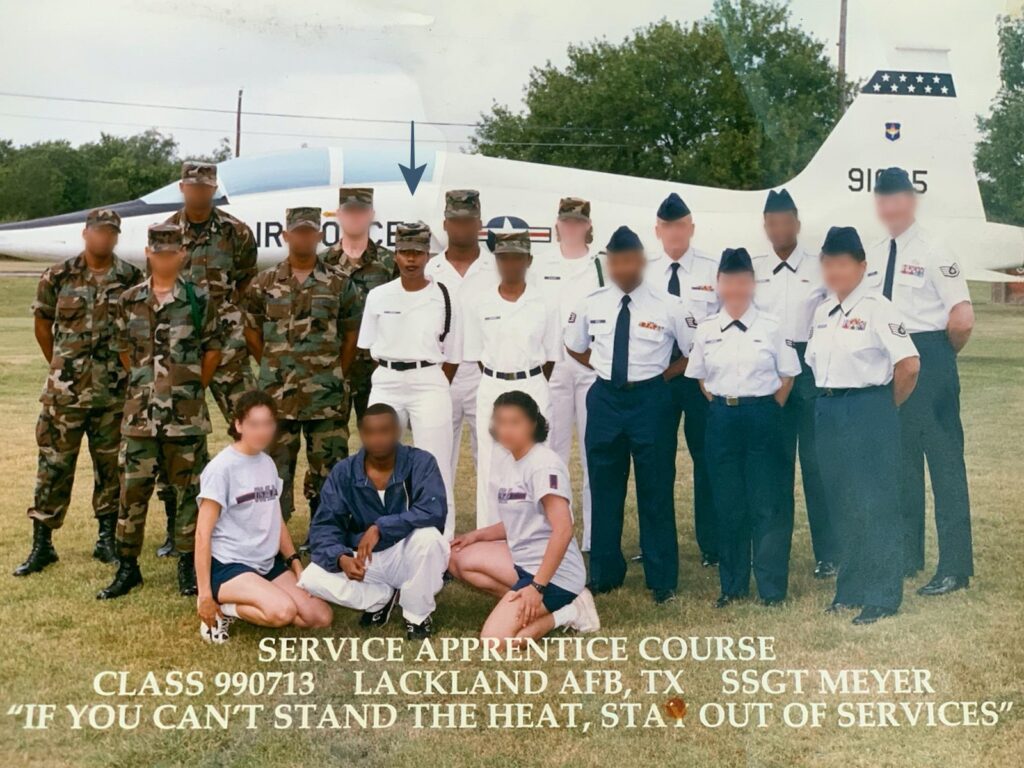

A BLACK WOMAN IN A MOSTLY WHITE MALE MILITARY
In a broader sense for Felder, joining the military as a black woman also meant learning to navigate interactions with white men, with whom she had nearly zero exposure to growing up. “I grew up in Loudoun County, Virginia. I’m not going to say it was diverse, but I really don’t think I experienced racism or anything like that. But when I think about it, I never really was around white men to even know their characteristics or personality.” Joining the Air Force was a bit of a culture shock. When Felder was still Active Duty in the mid-2000’s, Air Force senior enlisted were around 72% white and 87% male, while officers were roughly 88% white and 80% male.
“Starting out, I didn’t even know how to… interact with a white man. I just knew that he was in power and that I should listen to what he had to say. He was higher in the chain of command. I just assumed that they were more knowledgeable, and they were supposed to be respected.”
While Felder did work with some she genuinely respected and considered mentors, she mostly felt on guard with those around her. “White men feel like they can say anything. And you don’t even know how to respond. Like, is this normal for everybody else? Is this what he says all the time? Am I the only one that feels like this isn’t a good statement, or right? A white man in the military really has nothing to fear. He is superior. And we are just the rest.”
PLEASE NOTE: the following sections discuss harassment, sexual assault and other aggressive behaviors.
UNWANTED ATTENTION, INAPPROPRIATE BEHAVIOR
Even a brief observation of Felder reveals a bright presence about her that naturally draws others into her orbit. In the civilian world, this kind of charisma is a gift. As a woman in the military, it is not always a plus. Felder regularly found herself subjected to the whims of men who seemed to forget that they were not automatically entitled to her time, attention or personal space. She felt bombarded with unwanted attention, which sometimes crossed into inappropriate behavior.
There was the man who insisted she work directly with him on a deployment. When she asked him why, he told her it was just because he could. Or the man who walked into her workspace, threw papers in her face and told her to “pick that shit up.” When she reported his behavior, she was told, “that’s just who he is.”
WALKING A FINE LINE
The Air Force is 21% female, currently the highest of any branch of service. But it is still a male-dominated environment, and women can feel forced to walk a fine line with some of the men they serve with. Being firm or otherwise making it clear that aggressive attention is unwelcome can invite being labeled a bitch, or worse. Being too nice—or even slightly nice—can be mistaken as a green light for escalating the behavior.
It happened so much that I started getting mean. Get out of my face. Get away from me. You know what they said? I like it. You’re spicy.
Carmen Felder
In Felder’s case, she felt like she had to shrink and hide her personality just to get through her day. “It was just constant. To the point that when I went to the gym, I wouldn’t look people in their eyes.” She would wear headphones and look at the ground. Men would approach her anyway and aggressively try to make eye contact. “It happened so much that I started getting mean. Get out of my face. Get away from me. You know what they said? I like it. You’re spicy.”
ALWAYS ON GUARD
She made an effort to talk to the few other women that were around, but it was a challenge unless you worked a long shift together. “Twelve hours and you go work out and take a shower—there’s really not much room for getting to know people. And then sometimes you have to watch out for the women, too.”
During a deployment to Diego Garcia, Felder remembers a woman who would follow her to the showers. “They were just showerheads, so you didn’t have privacy.” She ignored hints and tried to play it off, even looking up the woman’s work schedule in an effort to try to avoid her. One night she came into Felder’s tent, crawled into her cot and made vulgar comments, stating her interest in a sexual relationship. Felder asked her politely to get out and not come back.
“That’s never a good way to see if somebody’s interested in you, right? Regardless.” It left her feeling like she had to watch her back from every direction. “I got used to it in the worst way. You shouldn’t get used to that. You shouldn’t have to be always on guard.”
REALITIES OF DEPLOYMENT
In the Air Force, Felder made multiple deployments to places like Diego Garcia and Qatar. While she was fully prepared to deploy, she was not ready for the loneliness that often came with it. “I was with all men. And at times I felt so uncomfortable. Because they were all senior enlisted and officers, and they treated me like I shouldn’t have been there.”
“THAT CHAPSTICK MUST BE REALLY GOOD.”
On one especially hot, dry deployment, Felder regularly encountered a Senior Master Sergeant from another unit. She was a Senior Airman at the time. He would remark on how good her Chapstick must be, and made other unsolicited comments that she did her best to downplay or ignore. One day, she entered his office to ask about the schedule. “He pushed me up against a wall and forced a kiss on me. I push off and say, what are you doing? Stop it! And he says, you know you want it.” It was a very small room and there was another man present when it happened. The other guy heard the scuffle, looked once, “then turned away like he didn’t want to be a part of it.”
On the way back to camp, she confided in a peer and asked if he would walk her to her tent for safety reasons. Not only did he say no, he walked off in the wrong direction just to make it crystal clear that he didn’t want to be involved.
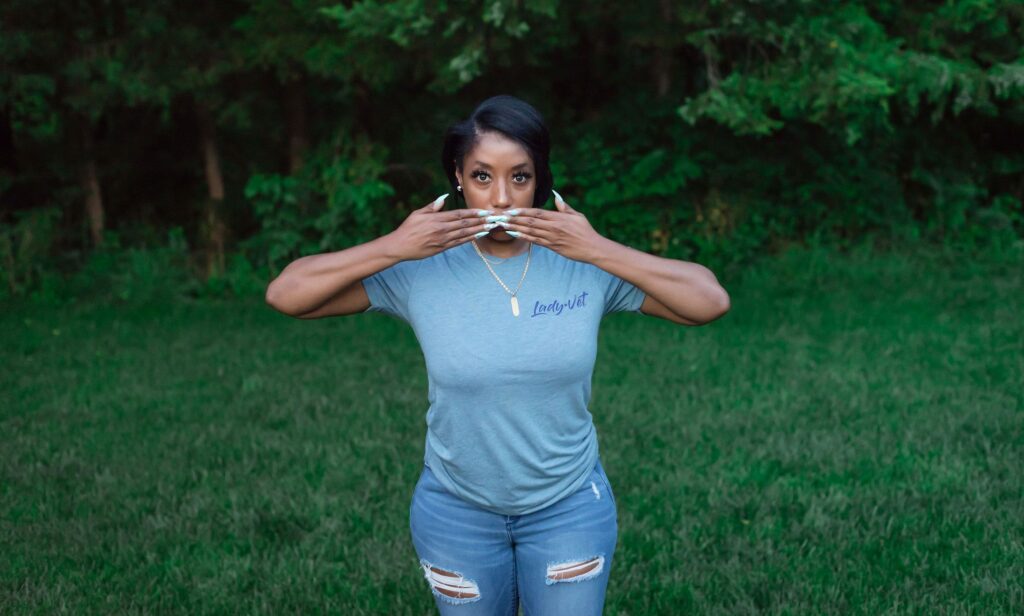

PERSISTENT AND UNRELENTING
“Now I haven’t flirted with this guy, the one who forced himself on me. I haven’t done anything, just normal work stuff. So we get off the bus and my heart is racing. And I start trying to walk fast, but not where it was obvious I was about to run.” Since the man who forced himself on her was taller and had longer legs, her brisk pace was no match for him. He caught up to her and said, “I know you liked it, and I want more.” He was persistent and unrelenting. “I know you wanted it, and I’m gonna get it.” She repeatedly told the man, who was four ranks above her, to leave her alone.
NO REAL REPERCUSSIONS
She went to the person in charge of her unit and told him what happened. “He listened, but I feel like he didn’t believe me or he didn’t want to hear it.” She was moved to a different area while her assailant was investigated by JAG. He was given a letter of reprimand and allowed to personally carry it back to his unit. “So you know that got lost. [JAG] said, we asked the other people and they don’t want to be involved.”
A BACKWARDS REALITY
At the same unit where she was harassed and forcibly kissed, there was a young Lieutenant. “He was just always smiling and we’d be talking nothing but business. Then he came to me one day and said, we can’t talk anymore.” He was told that he smiled at her too much. And if he kept doing it, they would both be seen as fraternizing and she would be moved. “I literally was not doing anything. In the case where there was nothing happening, they were making an issue out of it. But when you had a legitimate concern, nobody cared.”
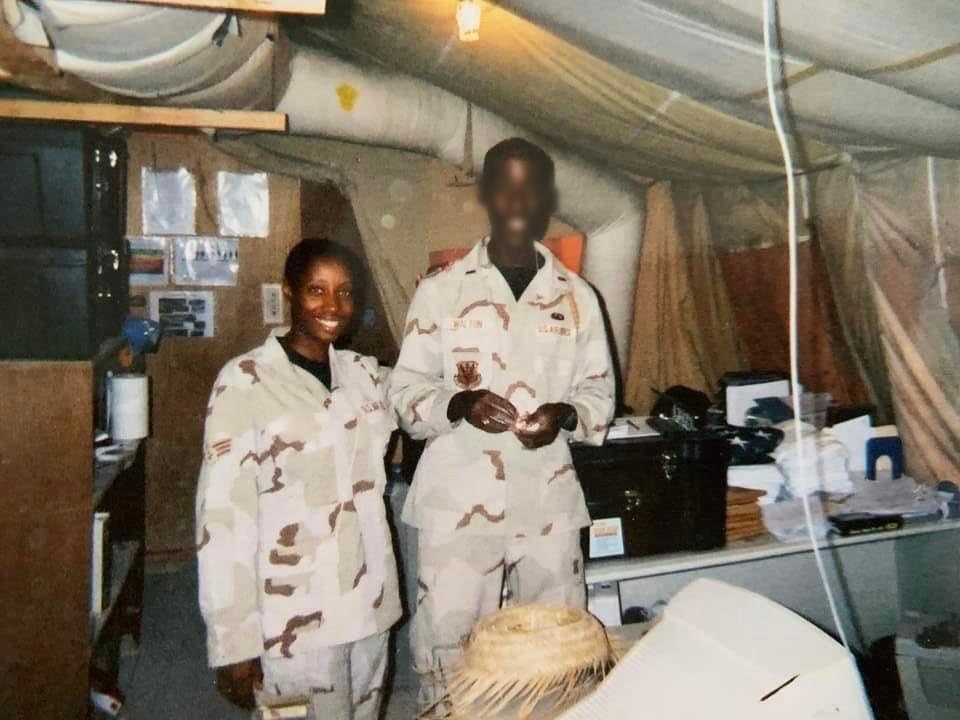

“It was almost like I was about trouble. Mind you, we were working 12-hour shifts. In the desert. Watching Training Day over and over and over again. You go to the gym, that’s about it.” She worked so hard to minimize herself and not encourage unwelcome attention and it was draining. But things would come up again and again. Somehow, “I was the troublemaker for saying something, or for being nice. It could really tear you down, or make you change your whole character. So I didn’t want to talk to anybody, I just wanted to work out and go home.”
POST-PREGNANCY DEPLOYMENT
There were other unexpected challenges she encountered as a woman in the Air Force. In 2005, Felder was blessed with her son Melaki. Based on Air Force policy at the time, giving birth meant she was placed in a non-deployable status for six months. (In 2015, Post Pregnancy Deployment Deferment was doubled to 12 months.) But when her son was just two or three months old, she was called to base late one night for a flurry of pre-deployment briefings.
RULES AND REGULATIONS
One of the things that drew Felder to the military in the first place was a sense of structure and the regulations that came with it. “What I appreciated about the military was that there were rules and regulations. There wouldn’t be any favoritism, right? Because there are rules. But I seemed to be getting deployed quite frequently. My son was born and the rules are, you get six months.” In her case, the rule was waived so she could be redeployed.
She felt part of the issue was too many people in a deployable status were given waivers that rendered them non-deployable. “The people who had some of these waivers, they’re not older. These are young girls that just didn’t want to go, they found a way out of it.” She cited back pain and other common reasons people give. “People get confined waivers if they just don’t want to go.”
“I didn’t even have the bandwidth or lack of integrity to make up a reason why I was hurt. Cause it’s just not me. I can’t even lie and say I’m hurt. I’m not. Even when everybody else is playing that game. I didn’t believe in it. If it’s my time to go, I’m gonna go do my job. But in my mind, I’m thinking, they’re not gonna send me. I just had a baby. I’m breastfeeding. They said no. You signed up for the Air Force, you’re leaving.”
DEPLOYING A BREASTFEEDING MOTHER
Felder had six hours’ notice to pack and say goodbye to her husband and newborn son. Her spouse was also active duty, and they had no family in the area. “So I had to tell my husband, I have to go.” He was caught in a storm of fury, fear and sadness, and there was no time for either one of them to process it. After a whirlwind list of pre-deployment tasks was complete, she spent her last few moments at home with her infant son lying on her chest, devastated at having to leave him behind.
HURRICANE KATRINA
As it turned out, the urgency to deploy Felder came from a hurricane that had just decimated a large swath of the Gulf Coast. Her unit was sent to New Orleans to help clean up the flooded wreckage left behind by Hurricane Katrina, which took more than 1,800 lives and caused $125 billion in damage.
She was there primarily to recover bodies. “I had this LT—he was young. And he was just as scared as anybody else. And we’re going through mush and water and bodies—it was just horrible. I’ve seen things and been a part of things that are probably indescribable—things you would never think in your lifetime that you would experience.”
Her deployment was indefinite and ended up lasting three or four months. At one point, she learned that her husband was struggling to take care of their son. The breastmilk she’d had the foresight to save for her baby had finally run out, and he would not take formula. “I have to deal with this and soothe him, and I don’t even know—I’m a new mother going through it myself.”
A TURNING POINT
She went to her LT to ask if there was someone who could replace her. The answer was no. It was a real turning point for Felder in her military career. Working and living in the aftermath of Katrina while her infant son struggled at home without her—it was one of the most trying times of her life, and a major reason she ultimately chose to leave the Air Force. “In my mind at that point, I’m like, I’ve done everything you asked and you all have changed the rules, turned your back on me and I’m over it.”
Her senior leadership told her she had it good, that she was stupid for wanting to get out, and she wouldn’t amount to anything if she did. “I think when you’re in power, sometimes you don’t even know how your words can affect someone. Or you don’t care. I think they didn’t care, or they were just being who they had been trained to be.”
TOUGH LESSONS
Looking back, being in the Air Force was the only time in her life where she ever felt bullied. “I don’t think those memories will ever go away. I think it just made me a stronger, more powerful woman. It helped me change my mindset—that I will be more powerful than someone who would treat me like that.”
While she couldn’t change what was happening at the time, she was taking notes for later. She was learning how not to treat others and vowed to channel that knowledge into something good in her next chapter of life. “Sometimes you go through things to make you stronger for the next.”
ADAPT AND SURVIVE
Felder also learned the need to adapt in order to survive stressful times. “There were years that I didn’t go home and had to learn how to be happy within myself and by myself. Loneliness, depression take over. Especially when you’re overseas and you’re just living Groundhog Day over and over again. You wake up, shower, go to work, workout—I mean, you’re almost like in a jail, knocking the days off.”
On certain deployments, there were only phone privileges once or twice a week. “If that person didn’t pick up, you were SOL. There’s been times that I tried to call my Mom and she didn’t answer, and I was heartbroken. I just wanted to hear her voice—I just wanted to hear someone I loved, and I didn’t know when I would be able to call her again.” Over time, she learned how to dig deep when needed and hone the personal resilience required to weather the lonelier aspects of deployment.
THE POSITIVES OF SERVICE
Ultimately, Felder achieved what she set out to by joining the Air Force. She was the first person in her family to go to college even though there was no money for it. “I knew I wanted to be a businesswoman, and I knew I wanted to travel and get my education. The only way I knew I could do that was joining the military. I knew it would get me started to being a good woman, a good person, and a good community leader, so that’s why I went in.”
Felder appreciates the military training she received and credits the Air Force with helping her buy her first home, earn her degree, and meet her then-husband, with whom she had her son. And despite the challenges of her environment, she found an excellent mentor and forged friendships with other women that remain strong to this day.
Spending years within a rank structure has left her with a healthy respect for anyone who puts time into their career field, whatever it may be. “I do feel like that has helped me become more diverse culturally, educationally, and that I can walk into any room and feel comfortable.”
That level of comfort has led her to some surprising places. “I can work with big football players now. I’m like, I already went through this in the military, you guys just don’t know. I’ve been through the egos. Now, I can take on just about any ego. I can be the toughest in the room and still keep my head up.”
VETERAN PERSPECTIVE
In speaking about her time in the Air Force, Felder highlighted some of the challenges that many women face during and after military service.
LACK OF SUPPORT
Most notably, Felder felt that she didn’t have an effective support system in the Air Force, especially when she was assaulted. “First of all, it’s hard enough for you to have to say something that’s embarrassing or hurtful. Then when you do say it, all you want is for someone to understand and empathize with you.” For Felder and others, it is a huge risk to take that may change nothing except to make life more difficult. In her case, it put a target on her back for speaking up, and she still had to work with the man.
OUTSIDE REPORTING AND ACCOUNTABILITY
She feels that outside reporting—where an entity outside the chain of command for those involved receives and investigates a complaint—would go a long way toward correcting the common practice of sweeping military sexual assaults under the rug. “A hotline could help make sure things were actually done properly.”
Speaking of her own situation, she said, “You know how they were thinking—oh, he made a mistake. He’s under pressure. We wouldn’t want to destroy his career over this. We use these excuses over and over again. I mean, it takes a bold person to do what he did. Because he knew he was gonna get away with it. Especially with someone else in the room.”
HARASSMENT AT THE VA
As with all Veterans, Felder is entitled to medical care at the VA. While she is enrolled at the VA in Washington DC, she tries to limit her visits to once a year. She describes what is a given at each visit: having to walk past a parade of mostly old men lining the halls, always ready to whistle or call you honey; asking for a smile, making suggestive or aggressive comments, or giving inappropriate looks. It is one more form of harassment waiting for women after they leave the service, and she avoids the experience where possible.
VISIBILITY AS A VETERAN
Visibility—or lack of it—is another common thread among women in the Veteran Community. “I always see myself as a Veteran. However, I don’t think people see me as a Veteran.”
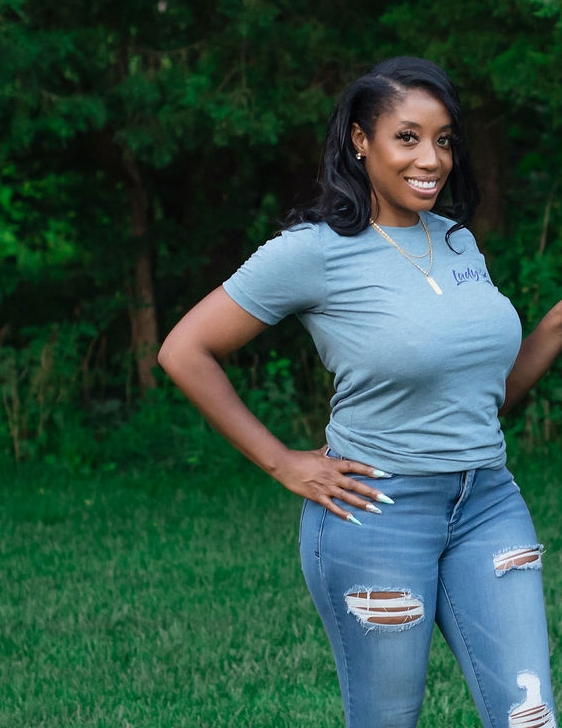

Felder recounted a recent Zoom call with several men who asked for the meeting, then ignored her (the Founder and decision maker), deferring instead to her male assistant. After the call, a friend said, “Carmen, you need to start telling people you’re a Veteran.” But she wasn’t sure that sharing her Veteran status would have changed anything.
“When I say I’m a Veteran, people look at me wide eyed. Like, there’s no way you can be a Veteran.” And she finds this response comes from women at least as often as men. It’s especially frustrating for Felder when people who never served have a hard time believing that she did.
When I say I’m a Veteran, people look at me wide eyed. Like, there’s no way you can be a Veteran.
Carmen Felder
“I always maintain myself as a Veteran but I don’t think I’m the face of Veterans, because they have a face that doesn’t look like me. And because I don’t have that face or I don’t have a limp or I don’t have a [visible] scar—then I’m not a Veteran.”
POST-SERVICE LIFE: WORK, CHARITY AND COMMUNITY INVOLVEMENT
Post-service life is drastically different for Felder. She kept her vow to take everything the Air Force taught her and channel it into something good. She is a hard-working, successful entrepreneur, and no one makes comments about her Chapstick these days. Felder founded her own company, offering services in public relations, business and career management as well as branding and marketing. She is also President of 89 Ways to Give, a community organization founded by retired NFL football player Santana Moss, who is one of her clients. The organization finds a variety of ways to give back, primarily in the greater Washington, DC area.
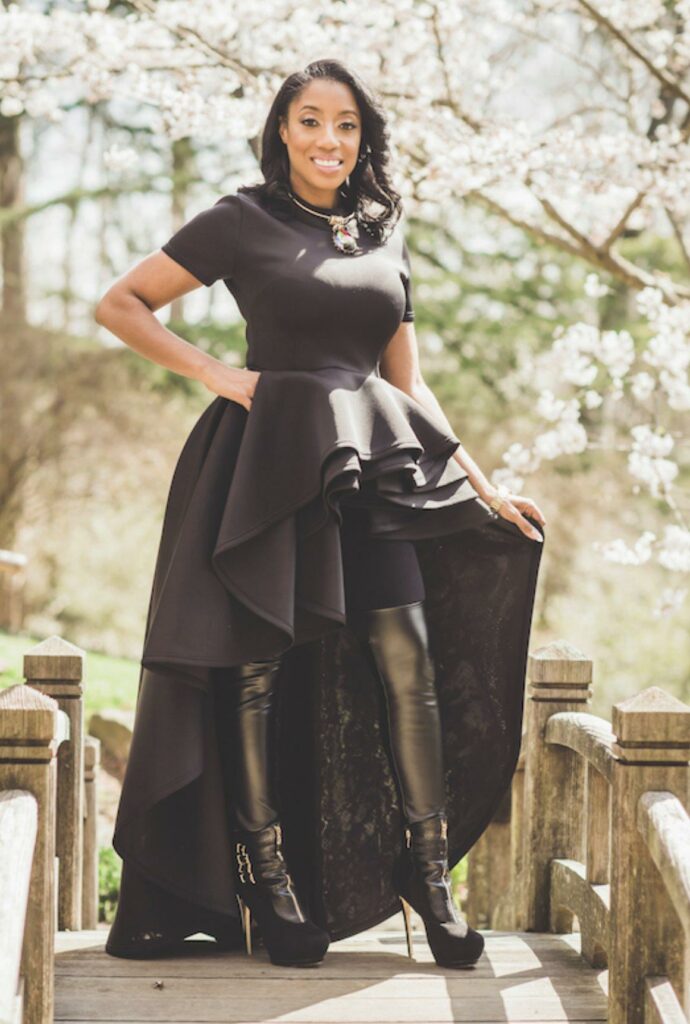

Additionally, Felder is the creator of the Socialites of Loudoun networking group as well as Black Businesses of DMV. “Since the climate change with Black Lives Matter, a lot of people want to help empower Black businesses but they don’t know how.” So she created a place online where residents of the DC / Maryland / Virginia metro area can find and support a variety of black-owned businesses.
More recently, she was named Chair of the Black Business Empowerment Committee through the Loudoun Chamber of Commerce, and became the newest board member of the Military Hire advisory board.
BEING FULL OF HERSELF
It is a full plate of commitments, and Felder enjoys every one of them. She paraphrases a quote from Oprah about how people will sometimes say that you’re full of yourself. “And she’s like, I want to be full of myself. Because if my cup runneth over, I have enough to give. So I always try to give back to the community and I’m not selfish—I have a lot of opportunities that fall upon me, and I need to be the steward that will pass that on to people in need. I try to use my platform, my knowledge and my connections to help other people.”
SUPPORTING EACH OTHER
She is a big believer in sharing the limelight and supporting each other when needed. “Don’t be that person that has to be in everything and the number one. When you’re down—and maybe they don’t always understand this—as a soldier, I’m supposed to pick you up and carry you.
HELPING OTHERS UNDERSTAND
Felder also sees the importance of women Veterans sharing their experiences. “Some of these topics people don’t talk about. And half the time we don’t talk about it because we don’t think they understand. Or we think that we don’t want to be heard. I think that this is very important. We can help make people understand.”
STILL A WIN
Looking back on her military experience—despite the barrage of harassment, the sexual assault and other challenges she faced while in uniform—she still considers it a win. She served her country and her countrymen; she got an education, both professional and practical; and the bond she formed with some of her Brothers and Sisters in the Air Force is everlasting and unbreakable. “With anything there’s trials and tribulations, there’s good and bad and some outweigh the other, but you use the good that you got from it to outweigh all the negative.”
Carmen Felder joined the Air Force in 1999 and made multiple deployments from MacDill Air Force Base during her career. She separated as a Staff Sergeant in 2007.




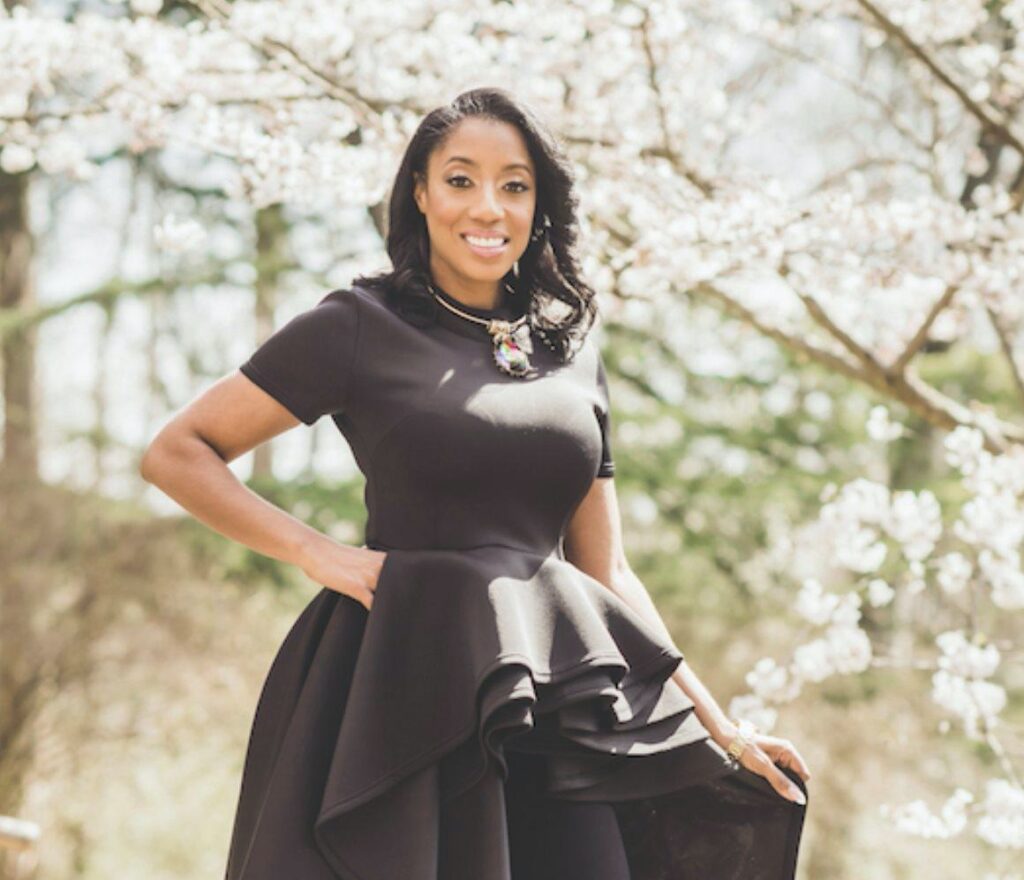
Excellent, honest and straightforward. Carmen is presented as explaining difficult experiences that can’t be condoned. Yet, she is positive and achieved a lot coming out of the military. She is a role model for taking on challenges and assisting others. Yay!